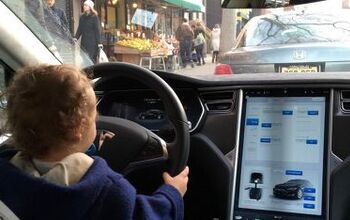Opinion: Tesla's Full-Self Driving Beta Is a Bad Joke

Earlier this week, Elon Musk announced that Tesla would begin offering the Full Self-Driving (FSD) Beta to testers that had achieved sufficiently high marks in its new “safety score.” While company has repeatedly promised to launch FSD in earnest, which costs $10,000 to purchase or $199 a month to rent (depending on which version of Autopilot you’re using), the system has been habitually delayed from getting a widespread release. This has upset more than a few customers operating under the assumption that having bought into the service actually meant something.
That said, the rollout has technically begun and continues encompassing more users. But regulators are annoyed that the company is now testing FSD’s functionality on thousands of paying customers and the terms in which Tesla is offering FSD has changed in a manner that makes your author extremely uncomfortable. The automaker originally intended to provide the system via a simple over-the-air (OTA) update as availability expanded. However Tesla now has a button allowing drivers to request FSD by opening them up to a period of scrutiny where their driving is digitally judged. Despite your having already shelled out cash for it, access to the beta is determined by the manufacturer’s safety score.
While I’ve always hated Tesla’s penchant for making bold promises that it later has to walk back and deliver late, its handling of FSD has been truly egregious. Paying customers have been expecting Full Self Driving for years at this point, with CEO Musk promising to have it ready to go in the summer of 2018.
By 2019, he said that there would be over a million vehicles using the system — which also turned out to be a lie.
We are now closing in on 2022, with FSD being trickled out to members of its early access program ( the ones that didn’t sue Tesla for false advertising) and placed availability behind an arbitrary and invasive 7-day scoring system. We know that automakers are already using vehicular connectivity to track your diving habits so they can be monetized in a manner similar to how Google chronicles your browsing history. But Tesla is now asking customers to willingly share information about their behavior while using an insurance calculator to determine whether or not you can try out a service you’ve already paid good money for.
Tesla has a FAQ about how the scoring is done. But it basically comes down to five factors, several of which are more likely to determine how much fun you’re having from behind the wheel than anything else. Metrics include how many times the forward collision warning was triggered, your average following distances, and the number of times Autopilot was forced to disengage. But Tesla is also monitoring the frequency at which your lateral acceleration surpassed 0.4 G or backward acceleration exceeded 0.3 G.
Stomping the brake hard or turning in too aggressively will disqualify you from even trying FSD. Though so will rampant Autopilot deactivations, which would be influenced more by road conditions than your personal driving style.
Listen, I don’t want to understate how important Tesla has been in regard to popularizing electric vehicles. But the brand has been underdelivering for years and frequently goes back on its word. Now it has nerve to demand customers be judged by their own vehicles in order to see if they’re worthy of having access to something they probably purchased years ago? Where are the pitchfork-laden mobs on this? How has no one crashed a Model S through Elon Musk’s front door yet?
And the FSD Beta still doesn’t amount to anything approaching genuine vehicular autonomy. While testers can have vehicles “drive themselves” on highways and city streets after inputting their destination on the navigational screen, it is still considered an SAE Level 2 driver assistance system because operators have to supervise the system at all times. Taking your hands off the wheel or looking elsewhere will result in some warning chimes, followed by prompt deactivation.
But that’s become commonplace in all vehicles using advanced driving aids, as companies have begun deploying increasingly aggressive monitoring protocols. In an effort to protect themselves, manufacturers are attempting to place the liabilities associated with “self driving” back onto the operator. Unfortunately, this appears to be ushering in industry trends bent on nullifying the privacy of operators in exchange for half-baked assistance programs that discourage engagement while simultaneously demanding your full attention.
Meanwhile, all the information that’s amassed by modern vehicles under the guise of autonomy is being leveraged by automakers and insurance groups to enhance their profitability. Consumers appear to have paid a high price for the privilege of being screwed by the industry and its bewildering that there hasn’t been more outrage pertaining to the issue. We’ve been sold a false bill of goods and should begin acting like it.
[Image: Tesla]

A staunch consumer advocate tracking industry trends and regulation. Before joining TTAC, Matt spent a decade working for marketing and research firms based in NYC. Clients included several of the world’s largest automakers, global tire brands, and aftermarket part suppliers. Dissatisfied with the corporate world and resentful of having to wear suits everyday, he pivoted to writing about cars. Since then, that man has become an ardent supporter of the right-to-repair movement, been interviewed on the auto industry by national radio broadcasts, driven more rental cars than anyone ever should, participated in amateur rallying events, and received the requisite minimum training as sanctioned by the SCCA. Handy with a wrench, Matt grew up surrounded by Detroit auto workers and managed to get a pizza delivery job before he was legally eligible. He later found himself driving box trucks through Manhattan, guaranteeing future sympathy for actual truckers. He continues to conduct research pertaining to the automotive sector as an independent contractor and has since moved back to his native Michigan, closer to where the cars are born. A contrarian, Matt claims to prefer understeer — stating that front and all-wheel drive vehicles cater best to his driving style.
More by Matt Posky
Latest Car Reviews
Read moreLatest Product Reviews
Read moreRecent Comments
- ToolGuy TG likes price reductions.
- ToolGuy I could go for a Mustang with a Subaru powertrain. (Maybe some additional ground clearance.)
- ToolGuy Does Tim Healey care about TTAC? 😉
- ToolGuy I am slashing my food budget by 1%.
- ToolGuy TG grows skeptical about his government protecting him from bad decisions.


































Comments
Join the conversation
You know: As strange, and disappointing, as this may seem to the terminally naive and gullible: Flash Gordon actually isn't real! Weird, eh? And: While Flash Gordon may have been a decent enough show back then, it has been a rather bad joke for quite some time now. Also, while we're on the topic of great, life changing surprises: Con men will continue selling The Brooklyn Bridge, for just as long as, tah-dah; there are people continuing to buy The Brooklyn Bridge! Now,I'll be darned!
I can hear the writing on legal pads now. Let the lawsuits begin!